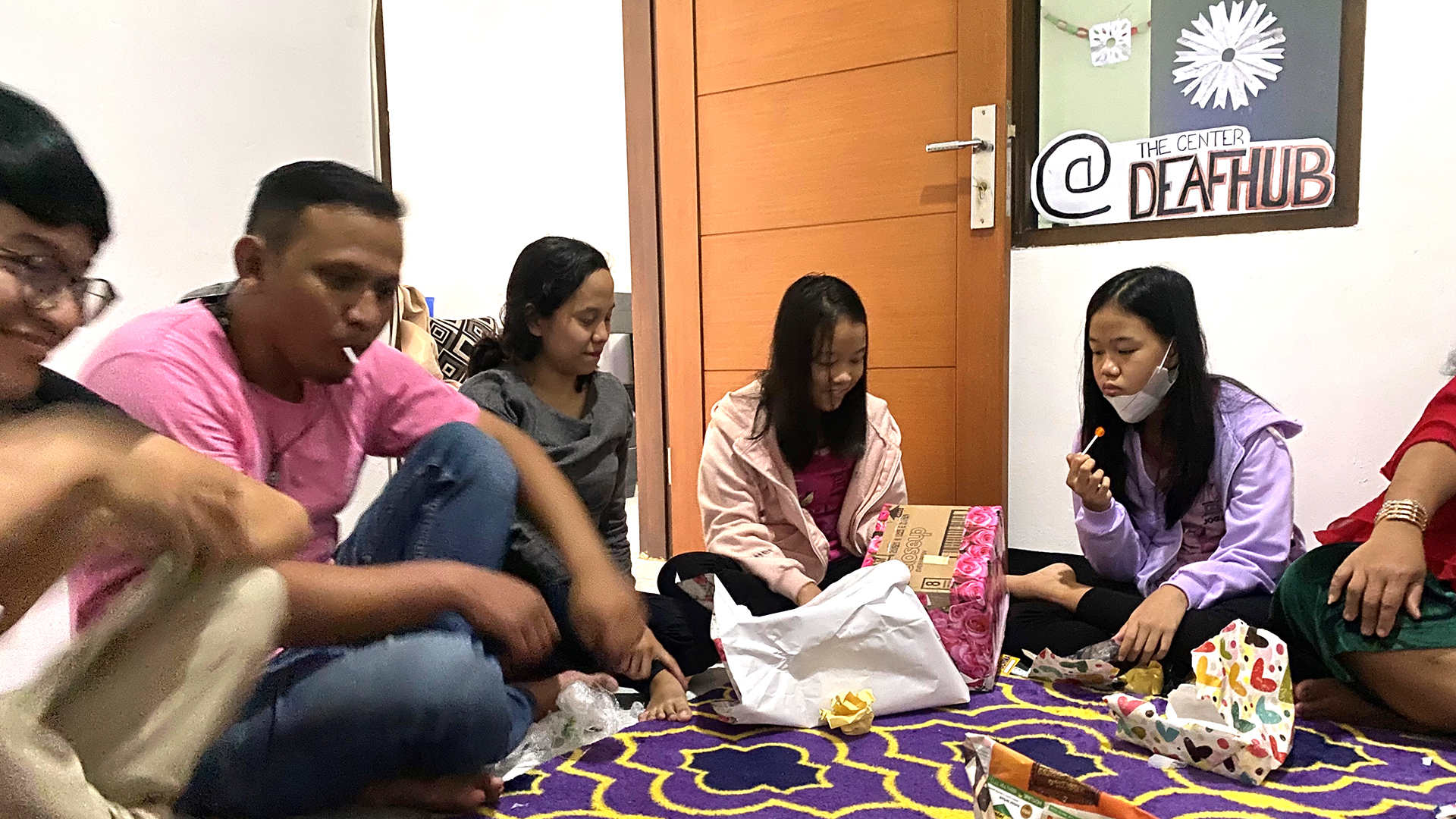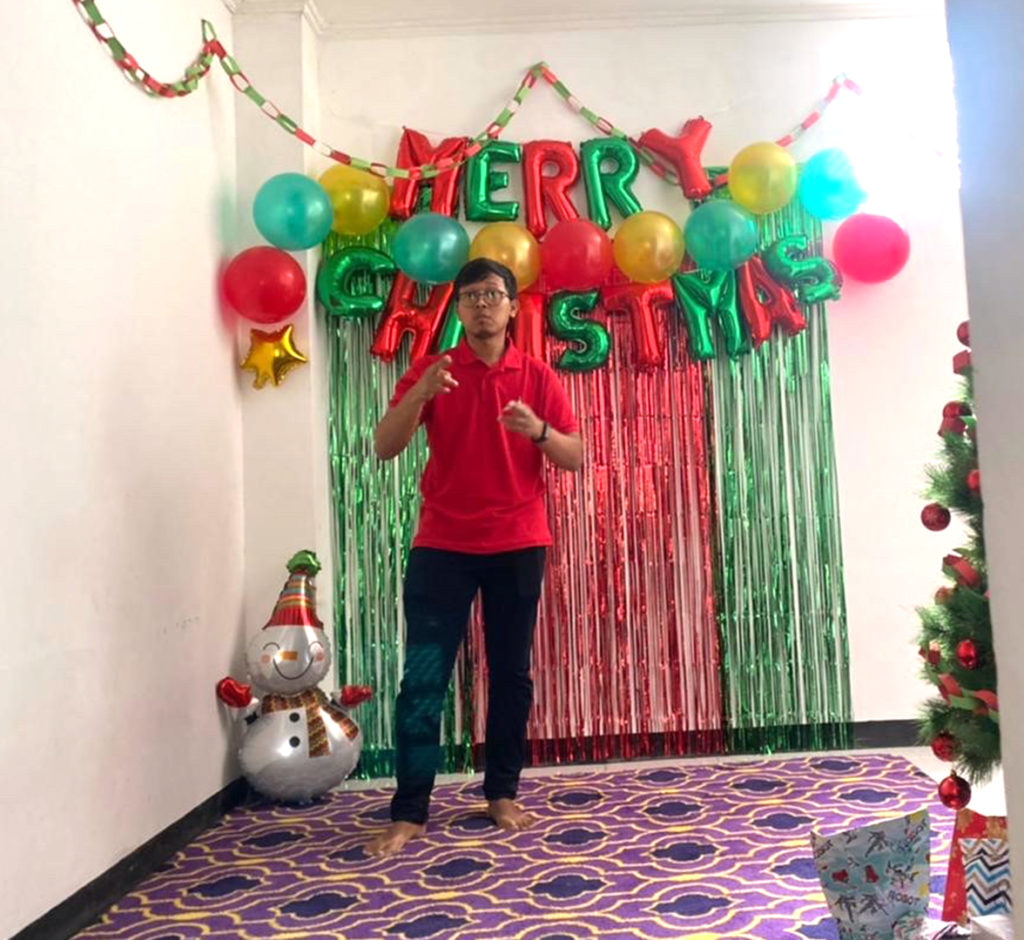Before a team of IMB workers and friends in Southeast Asia hosted a Christmas party for the Deaf in their city, they had a decorating party. Workers showed the group how to make traditional Christmas decorations like wreaths and paper chains. They also brought out a Christmas tree and lights, “which they love,” said Naya Wilder*, a member of the team.
After the group had fun making decorations, they put them up around the room and readied the place for their Christmas party later that weekend. The night of the party, the group played games like a white elephant gift exchange, which was a whole new concept for the Deaf group. In their culture, they don’t open gifts in front of other people (just in case their reaction isn’t what the giver expects), much less reject their gift and take someone else’s, as is expected during the game.

Participants play a gift exchange game at a Christmas party for the Deaf.
“Everybody went home happy though,” Wilder said of the group, who all left with cookies and treats.
Wilder said that events like these not only create fun and safe community for the Deaf, but they also open opportunities for gospel conversations. One of the Deaf who already attended group events regularly brought two friends to the Christmas party. Those three ended up staying late talking with one of the Deaf national partners on the team who shared many Bible stories with the visitors.
“[Our] national partners do a great job of sharing the truth in conversation, so hats off to them,” Wilder said. “It makes [me] smile to see people I knew as non-believers who are now believers. And now they’re sharing the gospel with such ease in these conversations and at this place. That’s what we want to happen.”
The place where workers host small events like this is an educational community center for the Deaf. Wilder described it as “a safe place where they can come and hang out.”
When there’s an event at the center, the Deaf national partners on the team will record an ad for social media then start video calling their friends directly about it, which Wilder said gets the news out quickly.
“They’re quicker than Instagram,” she said. “They (video) call each other all the time anyways just for the community.” Video calls allow the Deaf to easily communicate using sign language.
Community is highly valued among the Deaf, and even more so during the COVID-19 pandemic. When certain roads to the center closed during a lockdown, some people took the long way around, adding hours to their journey just to reach the center.
“In Deaf culture, one thing of crucial importance is that they have a place where they can come together and hang out,” Wilder said. “Throughout the week, [the Deaf are] usually not working alongside other Deaf. [In their culture], no one in their family can usually communicate with them. So for them to have a place where they can come any day, at any time, and just hang out with another Deaf person, that can mean the world, and it’s just life changing.”

A Deaf man signs, standing in front of decorations that the group made for the Christmas party.
Wilder said the province that includes the city where this team works is home to 75% of the country’s Deaf population. And the country has one of the largest populations of Deaf in the world. Because the Deaf are some of the least evangelized people groups, this team is working at an intersection of great need and great opportunity for the gospel to spread and flourish.
While much of the world was working to increase online ministry during the pandemic, workers among the Deaf continued with small in-person gatherings and focused on opening at full capacity as soon as possible. Wilder said in-person ministry among the Deaf is particularly important where they live because the internet infrastructure is not reliable. If a frame freezes, that’s it. They can’t just switch to audio because they require visual communication.
Once COVID-19 restrictions allow for the center to open at full capacity, the team plans to offer classes for the Deaf in the community – classes about the written English language, Western culture and international sign languages. Wilder said that many Deaf in the city who want to attend universities apply to schools in other countries where there are more opportunities for them. The center’s classes will equip the Deaf with practical skills to complete required forms in English and feel more aware of different cultures before jumping into them.
“Building the relationships is what’s most important out of the events and [classes] that we hold.” But once that relationship is started, Wilder said, “I’ve been known to share the gospel as quick as possible.”
Pray
- Pray that the center will be known in the city as a safe place where the Deaf can come have community.
- Pray for the government to grant the center necessary approvals as a legitimate educational center. This will help the workers secure long term visas.
- Pray that the gospel will reach the Deaf in this city in clear and convincing ways, so that every Deaf person will have the opportunity to repent and follow Jesus.
*Name changed for security.

